Lac-Megantic: The runaway train that destroyed a town
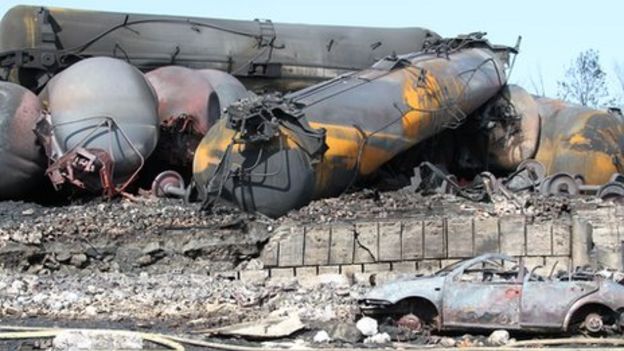 BBC
BBCNearly five years after one of the worst rail disasters in Canadian history, a small town at the centre of the tragedy is still grappling with the aftermath.
When Tom Harding walked out of the courtroom after being acquitted of criminal negligence causing death, he didn't speak.
The former train driver instead ducked away from the news cameras, overcome with emotion.
His one-time colleague, Richard Labrie, did have something to say.
"Could you back up a little bit so I can look at my paper? Because my eyes are full of tears," the ex-rail worker urged media crowding around him.
"To the 47 victims of the Lac-Megantic tragedy, I want to say that I hope you got the answers you were hoping through this trial process," he said.
 Canadian Press
Canadian PressLabrie said now that the case is over, his only hope is that he and his two colleagues "can actually turn the page now and become anonymous again as we were before".
Harding, Labrie and Jean Demaitre were charged in 2014 with criminal negligence causing death for their role in the Lac-Megantic rail disaster.
Harding was the sole engineer of the Montreal, Maine and Atlantic (MMA) Railway train that derailed in the town's core in July 2013 with its shipment of crude oil.
Labrie was in charge of rail circulation and Demaitre was manager of train operations that night.
On Friday, after a three-month trial and nine days of difficult deliberations by the jury, they were all acquitted.
Harding's lawyer Thomas Walsh called it a long, unusual and highly technical trial - basically "three trials in one".
How the Lac-Megantic disaster unfolded
On 6 July 2013, 47 people died in the small eastern Quebec town in the major derailment - deaths a Quebec coroner later called both "violent" and "avoidable".
Most victims had to be identified from DNA samples and dental records.
Just after 01:00 local time on Saturday morning, an unattended runaway train carrying 7.7m litres of petroleum crude oil barrelled into Lac-Megantic at 65 mph (104 km/h) and jumped the tracks near the centre of town.
It slammed to a stop and erupted in flames. The ensuing inferno destroyed most of the lakeside town's downtown core.
Twenty-seven children lost parents, over 2,000 people were evacuated and dozens of homes were destroyed.
Over 40 buildings were razed - including the public library - and millions of litres of oil seeped into the soil and the nearby Chaudiere river.
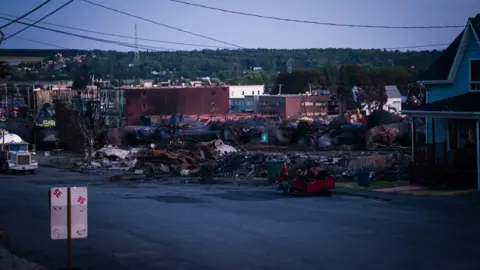 Getty Images
Getty ImagesPhone calls between Labrie, Demaitre, and Harding from the night of 6 July were released during the trial.
They paint a hindsight picture of missed chances to prevent the disaster and capture the men's slow realisation it was the 72-car convoy under their care that derailed in town.
'It was secure, RJ'
In an early call between Harding and Labrie, the traffic controller informs his colleague the lead locomotive, which had been experiencing mechanical problems, had caught fire.
Labrie tells Harding firemen had extinguished the flames and dismisses the engineer's offers to check on the train.
"Call me back RJ," said Harding.
"No, go to bed," Labrie responded.
At 01:47 local time, Harding calls after being evacuated from his hotel. The train had derailed about 30 minutes earlier.
 AFP
AFPHarding tells Labrie that Lac-Megantic is on fire "from the church all the way down to the Metro, from the river all the way to the railway tracks".
He describes flames reaching 200ft (61m).
Not much later, Labrie calls Harding with the news it was the MMA train that caused the inferno.
"It's your train that rolled down," Labrie said.
"No," replied Harding. "No, RJ."
He cursed and said "It was secure, RJ, when I left".
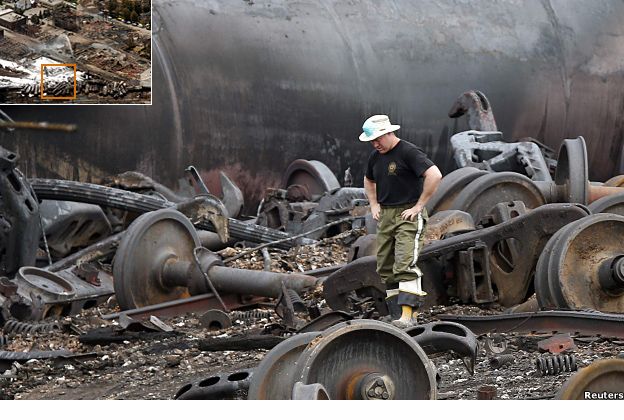 Reuters
ReutersCanada's Transportation Safety Board (TSB) found a chain of 18 contributing factors to the disaster, among them mechanical problems with the lead locomotive, insufficient use of handbrakes, a lax safety culture at train company MMA and inadequate oversight by Transport Canada.
"Take any one of them out of the equation and this accident may not have happened," the TSB's Wendy Tadros said after the report's release in 2014.
The TSB harshly criticised MMA, saying employees lacked training on the use of handbrakes and how to secure trains.
Tadros called it "a shortline railway running its operations at the margins" by cutting corners on engine maintenance and training.
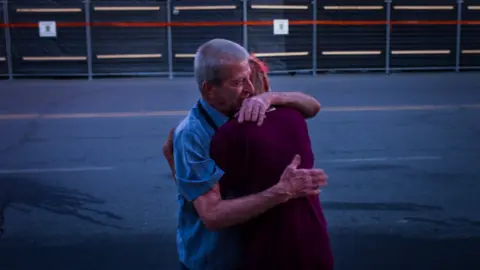 Getty Images
Getty Images"It changed everything, this tragedy," says Lac-Megantic Mayor Julie Morin.
"But it's also an opportunity to rebuild, and rebuild better. And that's what we're doing."
Nearly five years after the tragedy, the town is still in the middle of a multi-million dollar reconstruction project following a lengthy decontamination process.
 Courtesy Lac-Megantic
Courtesy Lac-Megantic Morin says the trial's outcome won't change much for Lac-Megantic.
"Yes, there were men behind this tragedy," she says.
"But there was a company, there was a government, other factors. And we still have a train that passes through downtown."
The town is lobbying for a railway bypass around Lac-Megantic to divert the freight trains that continue to whistle along the same tracks where the MMA train derailed.
"That's the only thing that preoccupies us," says Morin.
"All the rest - it changes nothing about what happened and what we're living with now."
Canada's Prime Minister Justin Trudeau has promised to expedite the process to get the track built.
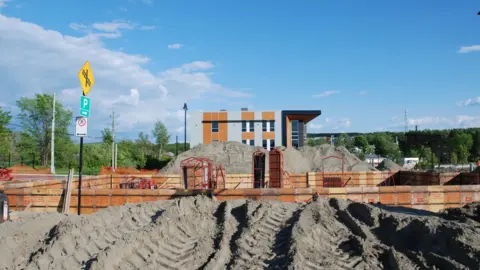 Courtesy Lac-Megantic
Courtesy Lac-Megantic At the epicentre of the blast was the Musi-Cafe, a popular bar that was packed in the early Saturday morning hours that balmy July night.
Thirty of the victims perished in that establishment, which became a symbol of the disaster.
Musi-Cafe was rebuilt in 2014 at a separate location. The names of the victims who died there are etched into the bar's new speakers.
Near its former site in the "red zone" of where the derailment occurred, a place of remembrance will be built.
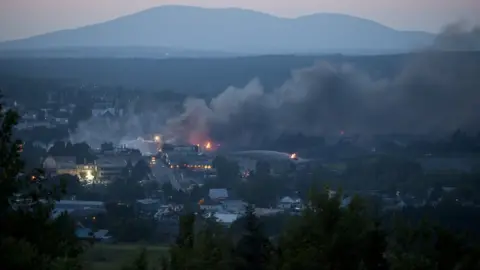 AFP
AFPResident Richard Custeau is representing grieving families on the committee developing the memorial.
He lost his brother, Réal Custeau, that night. The 57-year-old lived in an apartment near the train tracks and the Musi-Cafe.
How does the town start a new chapter without forgetting its past?
"If you asked me that question one year after I would have said 'we'll see with time,'" he says.
"Now I don't think we'll ever find the perfect balance."
Custeau says before the trial of the MMA employees began in October, he told himself he wouldn't miss a day.
"But now I just find it so wretched for those three men. It must be such a heavy burden to carry," he says.
"I prefer that justice takes care of it and I wish them luck, that's all I can say."
By many accounts, the tragedy has weighed heavily on Harding's shoulders.
During the trial, a Quebec provincial police investigator testified that the engineer was waiting at the police station the morning of the accident and co-operated willingly with authorities.
Randy MacDonald knew both Harding and his father, and worked the same rail routes when he was employed with Canadian Pacific Railway.
He hasn't seen Harding in more than 20 years, but says he was "just a regular railroad guy when I knew him".
He launched a website to help fund the locomotive engineer's defence even before charges were laid.
"I always felt it could have been me," says MacDonald, who lives in New York state.
He won't divulge the full amount he's raised but says donations have come in from all over, large and small.
Unions have publicly donated thousands of dollars to the fund.
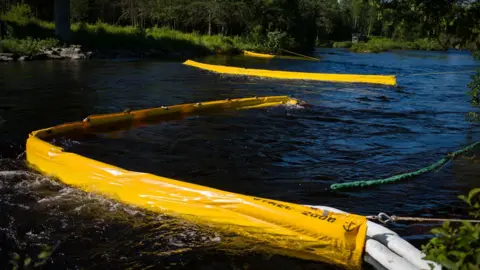 Getty Images
Getty Images'It's not them we want!'
Many residents of Lac-Megantic have publicly expressed sympathy for the three men as they were charged and tried, and lay the blame for the disaster at the feet of the company.
In 2014, when Harding, Demaitre, and Labrie first appeared in court, Ghislain Champagne - who lost his daughter in the tragedy - yelled "It's not them we want", as they walked in.
In October, the day the trial began, Lac-Megantic resident Jean Paradis, who lost three close friends that night, told journalists outside the courthouse that he didn't want to judge whether the three men were guilty or not.
"But it's clear to me the main shareholder, MMA, are not here. Transport Canada is not here. Transport Canada have let cheap companies run railroads in Canada with less money for more profit instead of acting or security," he said.
After the trial, Jean Clusiault told journalist that railway executives, not the three employees "should have sat in the bench of the accused".
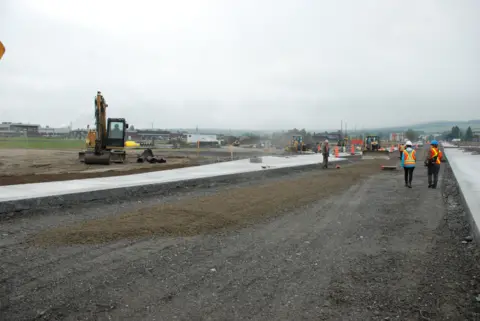 Coutesy Lac-Megantic
Coutesy Lac-Megantic The criminal negligence case against the three railway workers has drawn to a close but other legal battles related to the rail disaster are far from over.
MMA, now defunct, is also facing criminal negligence charges and will stand trial at a later date.
The company has pleaded not guilty.
A joined class-action lawsuit on behalf of about 6,000 people and companies affected by the tragedy, the Quebec government, and insurance companies - targeting Canadian Pacific - is due in court in 2019.
The railway company handed off the train carrying the Bakken oil to MMA that July.
Canadian Pacific denies any responsibility in the disaster.
In 2015 the federal government laid charges under the Railway Safety Act and the Fisheries Act against a handful of former railway employees, including Harding, Demaitre and ex-railway president Robert Grindrod.
All have pleaded not guilty.
